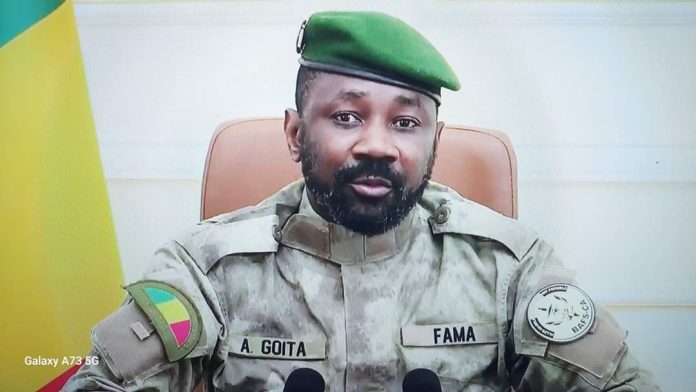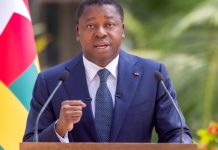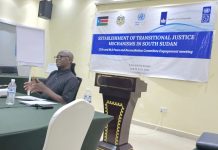By Biran Gaye
Colonel Assimi Goïta, Chairman of the Alliance of Sahel States (ESA), announced the upcoming launch of a new biometric passport, a move widely viewed as a big blow to ECOWAS’ efforts to bring back the coup-hit countries into the regional bloc.
This new travel document, which complies with international standards, will enhance security and facilitate the mobility of citizens of the Alliance member states.
Following the launch of the Confederation of Sahel States, the regional bloc ECOWAS selected the newly elected Senegalese president Bassirou Diomaye Faye to talk to the military leaders of the Sahel countries to rejoin the regional bloc. However, it remains to be seen whether there will be any progress in the negotiations of two parties who seem to have irreconcilable positions.
The Ministers of Foreign Affairs of Burkina Faso, Mali and Niger met today in Bamako for the first confederal session of the Council of Ministers of the AES, according to reports.
This historic meeting, which marks the first anniversary of the Liptako-Gourma Charter, demonstrates the determination of the three countries to strengthen their socio-economic integration and achieve a federation. The Ministers reaffirmed the commitment of their Heads of State to implement the decisions of the Confederation, reports say. They also strongly condemned the support provided by certain foreign States to terrorist groups active in the region, particularly Ukraine. During this engagement, the Ministers will examine several key documents for the establishment of the Confederation, in particular the preliminary draft of the Rules of Procedure, the draft Additional Protocol relating to the coordination of diplomatic action and the updating of the Roadmap.
The Alliance of Sahel States (AES/ASS) is a confederation formed between Mali, Niger, and Burkina Faso. It originated as a mutual defense pact created on 16 September 2023 following the 2023 Nigerien crisis, in which the West African political bloc ECOWAS threatened to intervene militarily to restore civilian rule after a coup in Niger earlier that year. All three member states are former members of ECOWAS and currently under the control of juntas following a string of successful coups, the 2021 Malian coup d’état, the September 2022 Burkina Faso coup d’état, and the 2023 Nigerien coup d’état. The confederation was established on 6 July 2024. It is against the policy of neocolonialism in Africa and the world. It is also anti-French and anti-ECOWAS in outlook, as it disagrees with many of their policies. The group has expressed strong opposition to Ukrainian support of rebels in the Sahel after comments by Ukrainian officials in August 2024 stating they had supported separatists that killed Malian soldiers. The AES has called on the United Nations to take action against Ukraine and accused Ukraine of supporting terrorism in the Sahel. As a result Mali and Niger have severed diplomatic relations with Ukraine.
Within the territory of the AES, there are various terrorist and insurgent groups including the ISGS, the Jama’at Nasr al-Islam wal Muslimin, and various separatist groups fighting in Northern Mali. The war against these groups has been assisted by both French and United States troops, with further assistance from UN peacekeeping forces. In 2024, the AES cut off military relations with Western powers and replaced Western military forces on their territory with Russian. The confederation’s stated goal is to pool resources to build energy and communications infrastructure, establish a common market, implement a monetary union under proposed currency the Sahel, allow free movement of persons, enable industrialization, and invest in agriculture, mines and energy sectors, with the end goal of federalizing into a single sovereign state.
The Sahel has been the site of an ongoing jihadist insurgency since 2003, which has led to many conflicts in the region, such as the Mali War and the Boko Haram insurgency. All three member states have had their pro-Western civilian governments overthrown by their militaries, and each is ruled by a junta as part of the Coup Belt. In 2022, Mali withdrew from the internationally backed G5 Sahel alliance. Niger and Burkina Faso did so in 2023, leading to announcement of the dissolution of the framework by its last two members Chad and Mauritania three days later.
In the 2020 Malian coup d’état, Assimi Goïta and the National Committee for the Salvation of the People seized power in Mali after overthrowing the elected president, Ibrahim Boubacar Keïta. Goïta later led a second coup in 2021 which deposed the interim president Bah Ndaw, who had been nominated to lead a transitional military government.
Just months later, in the 2021 Guinean coup d’état the National Committee of Reconciliation and Development removed the elected Alpha Condé and installed Mamady Doumbouya as transitional president.
A faction of Burkina Faso’s military overthrew their existing military government in the September 2022 coup d’état, installing Ibrahim Traoré over Paul-Henri Sandaogo Damiba, who came to power in the January 2022 coup d’état which toppled the democratic government of President Roch Marc Christian Kaboré.
Most recently, the National Council for the Safeguard of the Homeland removed the elected government of Niger’s Mohamed Bazoum, installing Abdourahamane Tchiani and a new junta in the 2023 coup d’état.
All three of the alliance’s member states are suspended members of ECOWAS; after the coup in Niger, ECOWAS has threatened to intervene militarily and restore President Bazoum’s government, which resulted in the Nigerien crisis. The Nigerien government has the backing of Mali and Burkina Faso, which promised military aid to Niger in the event of an intervention, and Guinea, which has been offering diplomatic support. The promises of military aid resulted in the creation of AES as a mutual defense bloc for the three nations in an attempt to stave off an ECOWAS intervention. On 28 January 2024, the three countries announced via a joint statement that they were withdrawing from ECOWAS.
In May 2024, Burkina Faso, Mali and Niger finalized in Niamey a draft text creating the AES, its objective is to finalize the project relating to the institutionalization and to the operationalization of AES.
On 6 July 2024, the military leaders at a summit in Niamey, Niger, signed a confederation treaty to strengthen the existing mutual defense pact. The signing marked the conclusion of the first joint summit of the alliance. Two significant outcomes of the summit were:
Colonel Assimi Goita, head of state of Mali, was named as president of the new confederation for a period of one year.



















